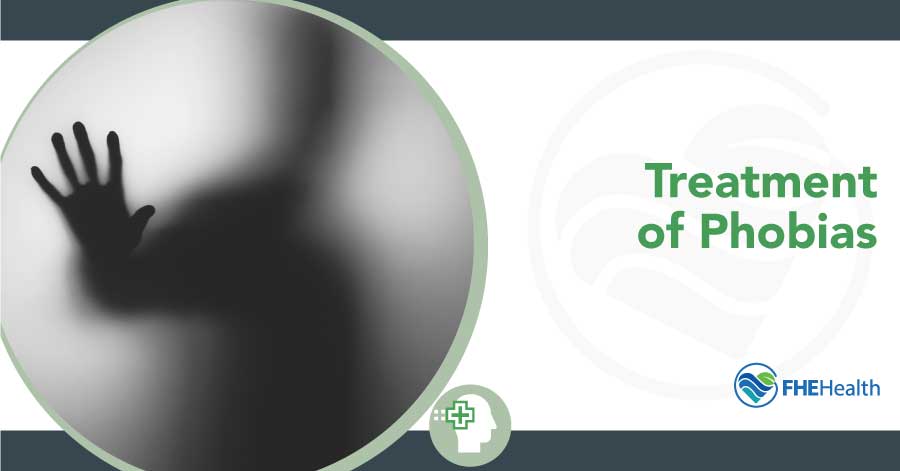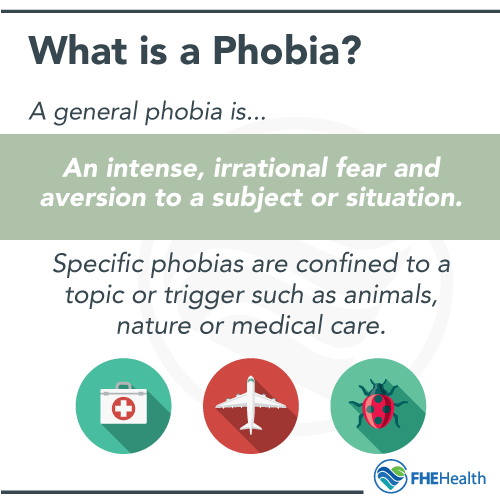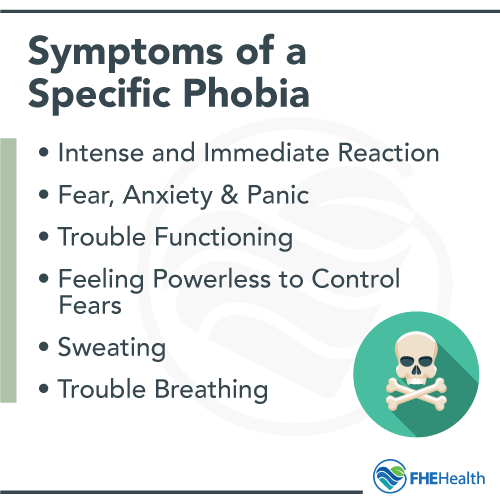
Everyone is afraid of something or someone, but phobias go deeper than that. Specific phobias can be overwhelming and are complex disorders to treat. The National Institute of Mental Health notes that 2007 data shows 9.1% of U.S. adults had some type of specific phobia in the previous year, and 12.5% struggled with phobias at some time in their life. Specific phobia treatment is available, and it may help you overcome your fears.
What Is a Phobia?
Overcoming phobias starts with understanding what they are. Specific phobias occur when a person has an unreasonable fear of certain objects or situations. In reality, those items pose very little or no danger to most people.
Yet, you may feel anxiety build if you’re close to or think about those items. Many people with phobias avoid those objects or situations as a result of these feelings.
This type of anxiety is long-lasting. For example, a person who feels anxiety when meeting with a boss may feel that way leading up to and during their conversation.
However, for people with specific phobias, the intense fear and the reactions to the object or situation last much longer. It can affect someone’s ability to do well in school or at work. Sometimes, it can limit social interactions and influence relationships at home.
Phobias are among the most common of anxiety disorders, so it’s important to realize you don’t have to hide such fears. If your phobia is impacting your social or work life, you should take action to improve it.
Common Specific Phobias

A person can develop a phobia of anything. Often, it’s not easy to tell why something scares you like it does. Take a look at a few common specific phobias:
Situational Phobias: Some people fear specific situations such as going to school, going to meetings, riding in an airplane, or being in an enclosed space.
Animal Phobias: Many people have an irrational fear of insects, dogs, spiders, sharks, or other animals, even if they know those animals are far from them and cannot hurt them.
Nature Phobias: Some people have a fear of the uncontrollable factors around them in nature, such as thunderstorms or tornadoes. Others are afraid of heights.
Blood and Injury: Everyone wants to avoid being injured or dealing with blood, but some people are terrified of any blood, injections, injury, or medical care. Some people are also afraid of accidents because they can create the need for medical care.
Other phobias include loud noises, vomiting, clowns, and choking. Some phobias are very common, such as acrophobia, which is the fear of heights, or claustrophobia, which is the fear of being in confined spaces.
Causes of Phobias – Where Do Phobias Come From?
It’s not well-understood why people develop phobias in some situations. It’s clear that if a person were attacked by a dog, they might develop a phobia of other dogs. However, this type of link isn’t always present.
Genetics may play a role in why some people have phobias and others do not. If there’s a known specific phobia in your family, you’re more likely to have one yourself. However, it may not be a fear of the same specific object or situation.
Environmental factors can also play a role. If you see your parents express fear over a specific object, you may develop a learned behavior from this experience, creating your own phobia of that object.
Another possible factor that some research indicates is brain function. Changes in the way the brain works, from any cause, such as trauma to the brain, may affect the development of a phobia.
What Are the Symptoms of a Phobia?
 Phobia symptoms are usually peculiar to the specific phobia a person has, but some symptoms are common across most forms of phobia, including:
Phobia symptoms are usually peculiar to the specific phobia a person has, but some symptoms are common across most forms of phobia, including:
- Intense, immediate reactions of fear when the object or situation is present
- Fear, anxiety and panic without even thinking about the source of that fear
- Trouble functioning when the feared item or situation is present
- Feeling powerless to control fears or thoughts around the feared item or situation
- Anxiety that worsens in specific situations when events get closer or objects become physically closer
- Avoidance of the feared item or situation, even if there are important reasons not to
- Elevated heart rate and feelings of being dizzy when around the feared item or situation
- Sweating
- Trouble breathing
Children can also experience specific phobias. When they’re exposed to the feared item or situation, they are likely to cry and cling to someone they feel safe near, but also may have a temper tantrum or beg to leave. Often, children can’t communicate what the object or situation is that they fear, but may still be adamant about leaving that area.
What Makes Specific Phobias Diagnosable Conditions?
If you have a specific phobia, it’s best to reach out for help. Diagnosing this condition yourself may seem easy enough. After all, if you’re afraid of heights, you probably know it. However, there are times when seeking medical care is important.
Because some of these specific phobias can have unreasonable levels of fear that stretch beyond annoyance, it’s wise to speak to a therapist or doctor about them if they impact your quality of life. For example, someone with a specific phobia of taking the freeway may find that this affects their quality of life and may even make it difficult to go to school or work.
Also, if the anxiety associated with the phobia is uncontrolled, it can lead to other medical or mental health challenges. In these situations, reaching out to phobia treatment centers tends to be the best move.
How Does Diagnosis Happen?
Being diagnosed with a specific phobia entails visiting your therapist, often at a specialized phobia treatment center, discussing your phobia symptoms and talking about why they happen. A clinical interview and diagnostic testing may help.
Ultimately, your therapist will use the American Psychiatric Association’s Diagnostic and Statistical Manual of Mental Disorders to make an official diagnosis. DSM-5 specific phobia criteria include:
- Unreasonable and expressed excessive fear
- Avoidance or extreme distress
- An immediate anxiety response to the fear
- Understanding what the fear is, but also understanding that it is irrational
- Life-limiting, meaning it impacts personal life, school, or work
- Has lasted at least six months
- Doesn’t stem from another mental health disorder
Getting a diagnosis is important. From there, your doctor can offer treatment options.
How Are These Fears Treated?
Treating phobias depends on the situation and the severity of the condition. Psychotherapy is the most common treatment method. It includes exposure therapy, which entails a gradual process of exposure to the feared object or situation with the goal of changing the response to the fear and teaching you how to manage your anxiety.
Cognitive-behavioral therapy can also be used to help some people with specific phobias. In this treatment, exposure and other techniques are used to help teach a person a new thought pattern and develop tools for coping.
Doctors may also recommend medications for some people with specific phobias. Though less common, this treatment may help to control panic attacks and anxiety that’s so severe it’s impacting a person’s health. Beta-blockers, for example, may help to stop the stimulating effects brought on by adrenaline. Sedatives may be used to help calm a person.
Getting Help for Specific Phobias
It’s not uncommon for people with specific phobias to also suffer from other mental health conditions. If you’re suffering from anxiety, depression or bipolar disorder, we encourage you to contact FHE Health to learn more about our mental health treatment options. Call our compassionate counselors at 833-596-3502 to learn more.






